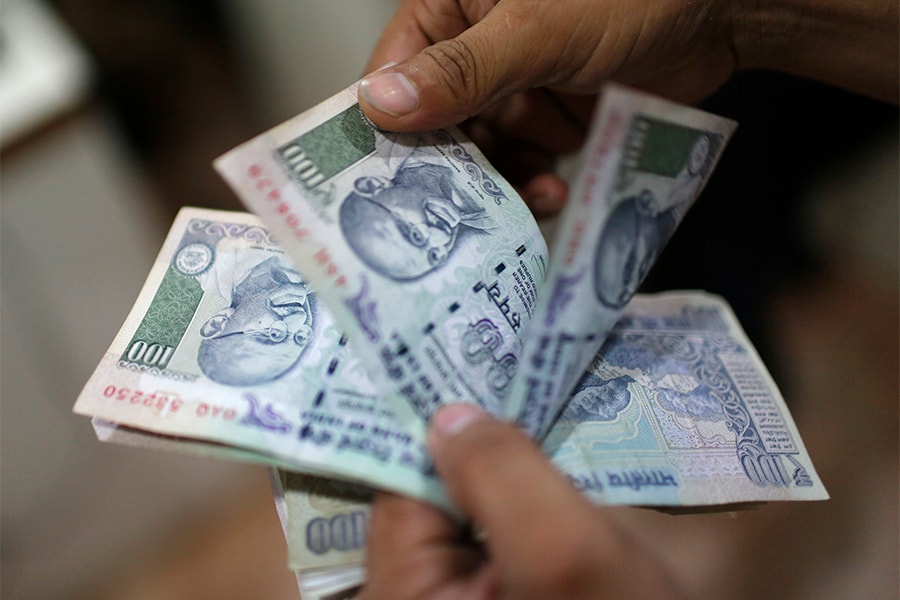
Jaitley wages war against black money; takes steps to ensure transparency in political funding
No cash transaction will be allowed above Rs 3 lakh in value while the maximum amount of cash donation that a party can receive will be Rs 2,000 from any person
 Image: Adnan Abidi / Reuters
Image: Adnan Abidi / Reuters
While the country may not have fully recovered from the impact of demonetisation yet, the exercise has revealed the extent of unaccounted money in the system if the quantum of deposits made is any indication. Finance Minister (FM) Arun Jaitley revealed while presenting the Union Budget on Thursday that between November 8 and December 30, 2016, deposits between Rs 2 lakh and Rs 80 lakh were made in 1.09 crore accounts. Deposits above Rs 80 lakh were made in as many as 1.48 lakh bank accounts. The FM used this information to drive home the need for expanding the fight against black money. “One of the main priorities of our government is to eliminate the black money component from the economy. We are committed to make our taxation rates more reasonable, our tax administration more fair and expand the tax base in the country. This approach will change the colour of money,” Jaitley said while pointing out that there are early signs of the success of demonetisation. If the rate in growth of advance personal income tax payment in the first three quarters of the current fiscal has risen by 34.8 percent, it is clearly due to demonetisation, he pointed out.
Jaitley also announced a slew of measures to curb the growth of informal economy. The amount of money that can be spent (either a capital or a revenue expenditure) in cash and claimed as a deduction under the Income Tax Act is being reduced to Rs 10,000. The cash donation one can make to a charitable trust is being reduced to Rs 2,000 from the earlier Rs 10,000. No cash transaction will be allowed above Rs 3 lakh in value. That apart, he also announced reduction in excise and customs duties for instruments that are imported for facilitating digital transactions like POS card readers or micro ATMs, etc.
The FM also continued with the government’s push towards digital payment platforms. “Promotion of a digital economy is an integral part of the government’s strategy to clean the system and weed out corruption and black money. It has a transformative impact in terms of greater formalisation of the economy and mainstreaming of financial savings into the banking system. This, in turn, is expected to energise private investment in the country through lower cost of credit. India is now on the cusp of a massive digital revolution. A shift to digital payments has huge benefits for the common man. The earlier initiative of our government to promote financial inclusion and the JAM trinity were important precursors to our current push for digital transactions,” he said. Jaitley said over 125 lakh people have downloaded the BHIM app and Aadhar Pay would be launched soon. “A mission will be set up with a target of 2,500 crore digital transactions for 2017-18 through UPI, USSD, Aadhaar Pay, IMPS and debit cards. Banks have targeted to introduce additional 10 lakh new PoS terminals by March 2017. They will be encouraged to introduce 20 lakh Aadhaar-based PoS by September 2017,” he said.
“The launch of AADHAAR Pay for people without mobile phones will spearhead the country’s transition to digital economy and perhaps make India a global exemplar in the digital arena. Renewed focus on proliferating digital to rural and semi-urban areas will further enhance digital inclusion, bridging the digital divide in the society and fostering financial inclusion,” says Neel Ratan, leader- government and public sector, PwC India. Adds Sanjay Rishi – regional president, American Express, “It is a welcome budget for us; it lays strong emphasis on strengthening the digital payments ecosystem in the country. In my opinion, the initiatives announced today such as reduction of excise duty on manufacturing of payment devices and exemption of SAD on miniature PoS & m-PoS machines; roll-out of 1 million new PoS terminals by banks; and setting-up of the Payment Regulatory Board in RBI to regulate electronic payments – will further boost India’s digital economy.”
Jaitley also announced the biggest reform in this space --- electoral funding. It will have a far reaching impact in the way political parties are funded. “India is the world’s largest democracy. Political parties are an essential ingredient of a multi-party parliamentary democracy. Even 70 years after Independence, the country has not been able to evolve a transparent method of funding political parties which is vital to the system of free and fair elections,” he said, adding “Political parties continue to receive most of their funds through anonymous donations which are shown in cash. An effort, therefore, requires to be made to cleanse the system of political funding in India.”
He announced that the maximum amount of cash donation that a political party can receive will be Rs 2,000 from one person. They can, however, receive donations by cheque or digital mode from their donors. He also announced that an amendment is being proposed to the Reserve Bank of India Act to enable the issuance of electoral bonds in accordance with a scheme that the Government of India would frame in this regard. Under this scheme, a donor could purchase bonds from authorised banks against cheque and digital payments which can be redeemed only in the designated account of a registered political party. He also made it clear that the existing exemption to the political parties from payment of income tax would be available only subject to the fulfillment of these conditions. “This reform will bring about greater transparency and accountability in political funding, while preventing future generation of black money,” he added.




